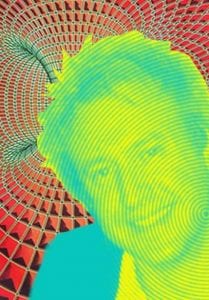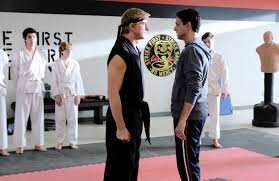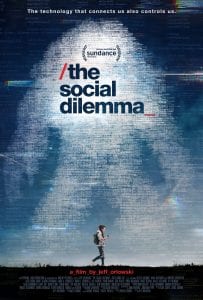From ‘Tiger King’ To ‘Last Dance’ To ‘Cobra Kai’ To ‘Social Dilemma,’ Netflix Has Nailed The Covid Zeitgeist
Are Netflix executives reading our minds?
There’s been an eerie pattern throughout the pandemic, in regard to the most popular programming emerging on the streaming platform. In an uncanny way, it’s mirrored the attitudes and zeitgeist of society at that time, especially over the past year during the time of covid.
 Certainly, some of it can be chalked up to unconscious needs and preferences being manifested in viewing choices — of people being attracted to certain programs at certain times and them becoming popular because the vast majority of us are feeling a certain thing at different times, and those programs fulfill a need for us, whether through escape or catharsis.
Certainly, some of it can be chalked up to unconscious needs and preferences being manifested in viewing choices — of people being attracted to certain programs at certain times and them becoming popular because the vast majority of us are feeling a certain thing at different times, and those programs fulfill a need for us, whether through escape or catharsis.
But it’s also been strange to watch, as programs have emerged and been added on Netflix that just so happen to perfectly nail that which we need and want to watch during these bizarre and uncertain times.
It’s been said there are no coincidences.
All actions, all events, are part of a lattice of connection that perhaps we can’t see, and of which we’re not aware, but that we all feel, consciously or unconsciously.
That’s what it means when you say something feels right. It feels like it should be. It feels like it should be of our time.
That seems to be true especially when it comes to entertainment. To be sure, at all times, there is popular entertainment. There is always something moving through the transom of our lives, of our consciousness, taking up the spotlight. But there are so few of those avatars of popular culture which become truly transcendent, that go beyond mere popularity to become not just ubiquitous but somehow perfectly fitting for that particular time. The Beatles. Disco. Nirvana. Reality TV. TikTok.

‘Tiger King’ was a strange barometer of our mood earlier this year.
It’s why the four most resonant programs during the covid-19 pandemic have been “Tiger King,” “The Last Dance,” “Cobra Kai,” and “The Social Dilemma.”
On the surface, they couldn’t be more disparate.
“Tiger King” was garish and lurid, the tale of seedy and strange zookeepers, rivals who no one could really root for, but who captivated our attention with their sensationalistic and selfish battles while behind-the-scenes, the alleged reason for their being, the tigers, were abused and used as props for their power plays. Sound familiar? It should.
“The Last Dance,” on the other hand, was bittersweet, beautiful and nostalgic, the story of one of the greatest athletes in the history of sports, and the way his farewell was tainted, ending an era in a sad and regretful way that still feels like an open scar.
“Cobra Kai” was bathed in nostalgia as well, a yearning for simpler times, but it went far beyond that to cast that nostalgia in a revelatory and unfamiliar light, showing that the good old days weren’t as good as we thought, and in addition to that, it also demonstrated that people are complex beings that evolve and change.
Finally, “The Social Dilemma” was by far the most serious of all of the shows, forcing us to look into the black mirror of our screens and the way social media has insidiously poisoned our society in so many ways.
All of the shows have mesmerized viewers like no others during the past two months.
And when you look at the last seven months, it’s not difficult to see why.
The time of covid has been chaotic and difficult, unprecedented in all of our lifetimes. It’s left people completely confused and feeling a strange sense of unease, because we have no reference point to it. None of us were alive and cogent during the last true pandemic over 100 years ago, and even if we were, the times have changed so much it would almost be irrelevant as to how each has impacted society.
Wars, recessions, political attacks, social violence, environmental disasters, those, sadly, have been mapped for us, and, also, sadly, we’ve become almost used to them, we take them in stride. However, this is new territory. We’ve never seen this particular virus because it’s something new, we’ve also never had a pandemic shut down governments and economies so thoroughly or have something we couldn’t truly control or get a handle on have such an impact on society. We also haven’t had anything like this happen during a time when people were all online and the spread of disinformation and the feeling of not knowing who or what to believe was so pervasive. It’s left people feeling very uncertain and adrift.
And so, whether consciously or subconsciously, we seek some stability to bear this time out.
Most of us had no choice but to weather it inside, and most of us turned to our televisions for escape and subconscious catharsis.
And that’s why these shows have been so popular, because they’ve been so relevant to that catharsis.
“Tiger King” came at the beginning of the pandemic, when everything was chaotic and unknown. We had no idea how to deal with this new normal. It was bizarre and unwieldy and, for many, frightening. We had no bearing to navigate it.

‘Tiger King’s’ Joe Exotic: A man for our times.
And in the midst of the frenzy emerged this show, which was completely chaotic and bizarre and unwieldy and, underneath its oddity, perverse and frightening, dealing with killing and violence and bloodshed.
But through watching it, we could escape. Not just in terms of entertainment and vicarious thrills, but through using it as a conduit for all the uncertainty and chaos of that early part of the quarantine.
Through all the chaos of “Tiger King,” there was humor, there was levity, there was some sense of being able to step outside the turbulence and stand watch as it happened to someone else, and in being able to do so, it made us feel better about ourselves and our worlds. Subconsciously, perhaps, it was a way of laughing through fear and uncertainty. But there was also something that struck a familiar chord for us. In many ways, we were the tigers, the ostensible reason for being for this world, watching as our leaders from various sides squabbled, fought, grasped for power, and trafficked in the ridiculous and audacious, all while we were left to just wait and see how this circus was going to affect our well-being. We had little to no control over it, so at best all we could do was laugh at the absurdity and chaos of everything. “Tiger King” gave us an outlet for that.
Eventually, however, things somewhat stabilized. We began to embrace the new normal. It became easier for us to get by, to navigate the strangeness of the new world, with all of the social distancing and masks and working from home and everything else that went along with it.
But along with acceptance and assimilation came an air of sadness.
Came a recognition of loss.
Once we were able to navigate our new world, once we were able to get beyond the initial shock – the fight or flight mechanism that honed our attention to only that which was pertinent to the here and now – we were able to think, to feel, about what was happening.
And that wasn’t necessarily a good feeling.

‘The Last Dance’ scored big audiences for its poignant tale.
We thought about the missed graduations, and birthdays, and sports seasons, and our friends and family, and just our normal lives and being able to do things we’d always taken for granted.
We were surviving, we were navigating it, yes, but it wasn’t our ideal. It wasn’t what we wanted.
And that’s where “The Last Dance” came in.
When was the last time things were truly good for us and our country?
The ‘90s.
Before 9/11. Before the endless wars. Before the umpteen recessions and economic collapses. Before the bloodthirsty divisiveness and hatred between sides. The virulent tribalism of the internet. The superficiality and insecurity fomented by social media and reality TV. The constant “scandals” pushed to goose media ratings. The huge economic divides.
The ‘90s were, for most of us, the last time things seemed good, or even seemed like they had the hope of being good, beyond any cynicism.
The Chicago Bulls of the ‘90s and Michael Jordan represented that idyll. They were the prominent sports and pop culture heroes of our time. Watching that show reminds us of where we were then, and who we were then, both as individuals, and as a nation.
The economy was great. We weren’t at war. We certainly weren’t in quarantine. The cost of living, the cost of college, the cost of everything, was far lower. And while there were definitely political and social divisions, as there have been for centuries, they weren’t anywhere as vicious as now, and they weren’t being flamed by the ubiquity of opinions on social media. It was a pre-9/11 world. And it was a pre-ubiquitous internet world, where the new technology we were just learning about was full of nothing but hope for a better future, a better time, a better life for all of us.
Watching “The Last Dance” isn’t just about watching the Chicago Bulls. It’s about taking a time machine back to a time when things were so much easier and simpler. The last time we could actually, truly, say that.
And, like “The Last Dance,” like the end of those Chicago Bulls and Jordan’s career, it feels like it ended far too soon, and was taken away from us long before our time, by forces beyond our control.
And we miss it. We miss having that hope, that opportunity, that world that seemed so much easier to navigate.
 And in watching Michael Jordan, one of the greatest athletes in the history of any sport, a man who worked relentlessly, with incredible loyalty, to build not just himself but his organization, from nothing, many of us feel some sense of community with him. We think of the years of our lives spent poured into hard work, unpaid overtime, incredible loyalty, to companies and businesses and a way of life, only to see it rewarded with job loss, a lack of appreciation, and a venomous condescending arrogance. When Jordan spits out Jerry Krause’s line about “organizations winning championships” being used to dismantle one of the greatest teams ever, he’s not just speaking for the Bulls, he’s speaking for all of us who have seen offices full of great, hard-working people at the tops of their games get capriciously and cruelly cut away.
And in watching Michael Jordan, one of the greatest athletes in the history of any sport, a man who worked relentlessly, with incredible loyalty, to build not just himself but his organization, from nothing, many of us feel some sense of community with him. We think of the years of our lives spent poured into hard work, unpaid overtime, incredible loyalty, to companies and businesses and a way of life, only to see it rewarded with job loss, a lack of appreciation, and a venomous condescending arrogance. When Jordan spits out Jerry Krause’s line about “organizations winning championships” being used to dismantle one of the greatest teams ever, he’s not just speaking for the Bulls, he’s speaking for all of us who have seen offices full of great, hard-working people at the tops of their games get capriciously and cruelly cut away.
It’s been a sight all-too-familiar during this pandemic.
And it’s caused people to evolve in ways they never saw possible, re-evaluate what they once thought of as the path to the American dream, and look at their lives and how they and others have changed and had to evolve.
That’s when “Cobra Kai” came around, in late summer and early fall, as this “new normal” was making us question if there was ever really any normal at all, or if it was all an illusion.

‘Cobra Kai’ emerged as one of the best-written and thoughtful shows of the year.
That’s one of the biggest subtexts of “Cobra Kai,” which looks at the black-and-white, heroes-and-villains world of the “Karate Kid” movies in a far different, new, and complex light. It doesn’t just show where the characters are now, it follows them as they reveal themselves to be all-too-human and full of both glories and flaws. It also re-examines the entire past of the series from different perspectives to show that not everything was as clear as we thought. As we look at the past through the perspective of once-certain-villain Johnny Lawrence, we see that once-certain-hero Daniel LaRusso wasn’t as perfect as he was painted, and Johnny and his fellow Cobra Kai weren’t completely bad but were more products of their backgrounds.
This came as more and more people were forced to look upon their own lives, and their own choices. Imagine being that person in their 40s or 50s or beyond who was laid off their job. I’ve certainly been there. You did everything right. You followed the American dream. You worked hard, you did everything you were asked, you put in extra overtime, you did everything society and capitalism demanded of you and instead of getting the success and security you were promised by the system, you were betrayed and cut loose, fired and screwed over, just as you were nearing your retirement, the capstone of

The faceoff between Johnny and Daniel was given new context in retrospect that fit into the ambiguous times we live in.
all the time you spent doing “the right thing.” It made you re-examine those priorities and whether or not what you were fed was just a bunch of crapola. “Cobra Kai” does the same thing in re-examining its own past mythology.
And, much like people have had to adapt and evolve, so do the characters in “Cobra Kai,” and they do so in ways that are messy and not always easy. They try and fail. They attempt to do the right things and they don’t work out. They question their actions, and wonder whether it’s worth it to bother. Just like so many of us have done during this time.
Most recently, as we’ve neared the fall, and election season, and the threat of a renewed pandemic and covid suffering, there emerged the darkest documentary to capture our attention among all the shows listed here. “The Social Dilemma.”
Most disturbing because it’s based in thoroughly-researched fact, it shows us a very dark picture of how we’ve become such a divided society and has given a very clear explanation as to why, going into this election season, going into the dark pit of a second wave of the pandemic, people have been so ready to discard facts, science, reason and rationality in lieu of conspiracy theories, pseudoscience, and nefarious

The poster for Netflix’s “The Social Dilemma.”
schemes of manipulation. It’s not the most pleasant picture, but it’s one we need to face when asking ourselves how we got here, because facing it is the only way we can take action and change things for the better.
“The Social Dilemma” is not pleasant, but neither are the undercurrents of our society right now. Just yesterday, the FBI uncovered a plot to kidnap and kill the governor of Michigan. More than two dozen high-ranking politicians, including Donald Trump, have contacted covid. There’s still no sign of an economic relief package even as millions of people continue to lose their jobs and statistics show that up to half of the small businesses that existed in our country on Jan. 1 of this year could be out of business for good by Jan. 1 of the next. These are dark times, that need to be addressed to be rectified, and the only way to do so is through addressing them factually and accurately in order to change them. “The Social Dilemma” presents that same bitter pill. And it’s poignant that during this time that message has resonated to the point where the documentary was the top-rated program among all streaming programming over the past month.
Just like “Tiger King” was during its time.
Just like “The Last Dance” was during its time.
Just like “Cobra Kai” was during its time.
It’s always difficult during times like these. It’s often impossible for many of us to express our feelings, to put them into words, or even fully

‘The Social Dilemma’ is disturbing and provocative.
express that we even feel them. But they’re there. And oftentimes, whether consciously or not, we seek out entertainment, alleged escapism, in the form of some catharsis, that allows us to watch and experience these things and to get those feelings out through the characters on screen, through the things going on in these movies and shows.
When nobody knew what to expect, when everything was a surprise, when we desperately wanted to be able to laugh in the face of fear and the potential of something horrible, “Tiger King” was there, giving us constant surprises that we could laugh at and that entertained us, and an underlying tone of terror that we could experience with distance and a dark humor, like the catharsis of a horror film.
And as we came to grips with that, as we began to really mourn and feel the bittersweet nature of life during covid, there was “The Last Dance,” to allow us to feel those same things through the people in the film, somehow wishing they could go back, for one last dance with that era, and yet knowing they could only look back and wonder, and hope that someday, things would be right again.
Then as the year progressed and job losses became untenable and disillusioning, there was “Cobra Kai,” to make us re-examine our pasts and how they related to our present, and to try to navigate our way through uncertain times and come to terms with not just our own imperfections but those of the world around us.
Most recently, as we near an even darker time, there was “The Social Dilemma,” to shine a very bright and often uncomfortable light on our society, to bring us to terms with it, so that hopefully, we could change it.
Each has reflected us at the time we were watching it. And in some ways, each one reflects the way we are now. Wondering. Uncertain. Hoping that someday, things will be right again. Trying to find answers, solace, some sort of structure in a very nebulous and shifting world.
That’s the role entertainment plays for us.
That’s how it touches our souls, our hearts.
That’s why it’s important to us.
And that’s why it’s been so important to us during this time. Because we’ve needed it now, more than ever. And we still do.









